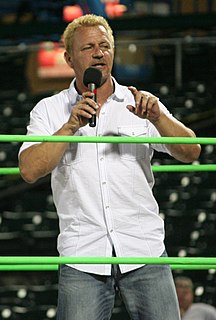A Quote by Robert Osborne
When I was growing up, you'd read about actors, and they'd never tell you their age and how much they made a year as part of their definition.
Related Quotes
I guess...on one hand, I spent way too much time watching science fiction and reading science fiction when I was growing up. But a part of it is I also never felt much of a connection to the world in which I lived while I was growing up, and so, oddly enough, I think I felt a lot more connected to the worlds that I read about in science fiction.
Many people will tell you that an expert is someone who knows a great deal about the subject. To this I would object that one can never know much about any subject. I would much prefer the following definition: an expert is someone who knows some of the worst mistakes that can be made in the subject, and how to avoid them.
I talk all the time about how much I read growing up and how much I love Stephen King and how he impacted my work from a genre perspective, but Pat Conroy wrote some of the most magnificent stories about characters who had to deal with dysfunctional families and try to find a place of honor in their own world and the pain of loss.
We're not cognitively equipped to deal with it. And it's becoming a problem, frankly. It's part of the reason why I quit Facebook. We all hear these things and read reports about how our attention spans are shrinking. It makes me wonder about the generation growing up now, how it will affect their brain development.
I heard about Bhagavad Gita very early in my childhood, from the age of five onwards. It was one of the earliest things I started to read when I started to read. And it was very much a part of my consciousness. In the beginning, I saw the "Bhagavad Gita" as a text that was very classical, much like the "Iliad" and the "Odyssey" - a mythical saga that showed the eternal conflict between good and evil. But much later, as I grew up, I realized that it was much more than that.
I wanted to be an actor ever since I was five. My grandparents - my mom's parents in New York - were stage actors. I think indirectly I wanted to do it because of them. My grandfather would tell me stories about Tennessee Williams and actors he worked with in New York. He had such a respect for acting and such a love for storytelling about that world. I grew up hearing him tell tales of it.They were never encouraging me or discouraging me to take part. They were always feeding me with theater.
I never was that boy who loved gangster films, but when I was growing up, I was obsessed with the detective Dick Tracy. It was one of my favourite movies as a kid, and he really inspired me. I would have loved to be part of that golden age of Hollywood in the 1940s. It made me want to become an actor.
Grown-ups love figures... When you tell them you've made a new friend they never ask you any questions about essential matters. They never say to you "What does his voice sound like? What games does he love best? Does he collect butterflies? " Instead they demand "How old is he? How much does he weigh? How much money does his father make? " Only from these figures do they think they have learned anything about him.




































